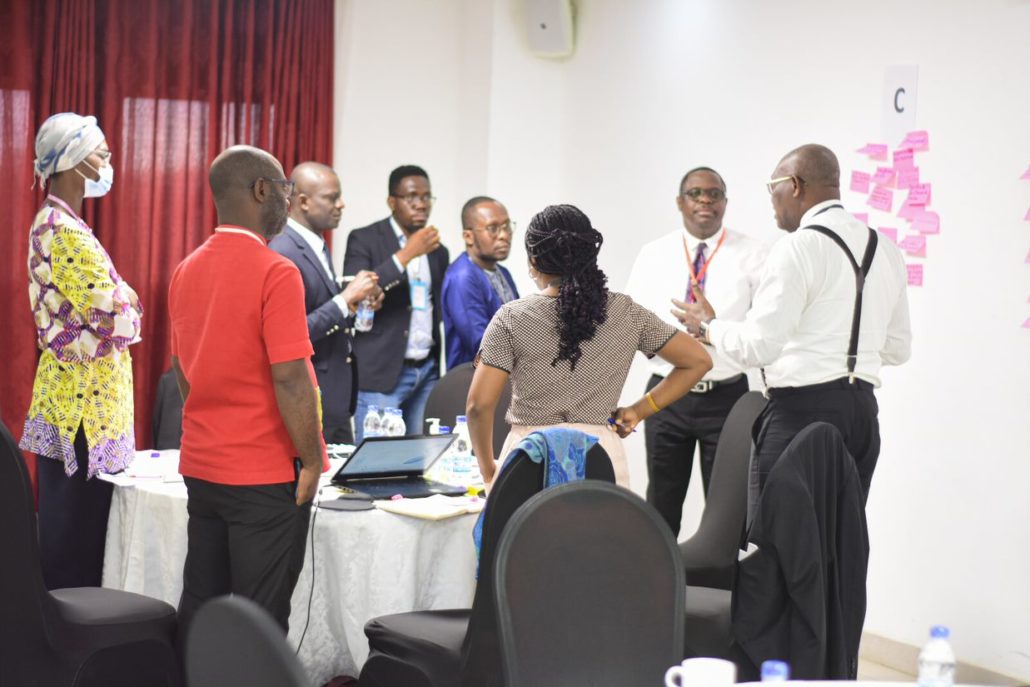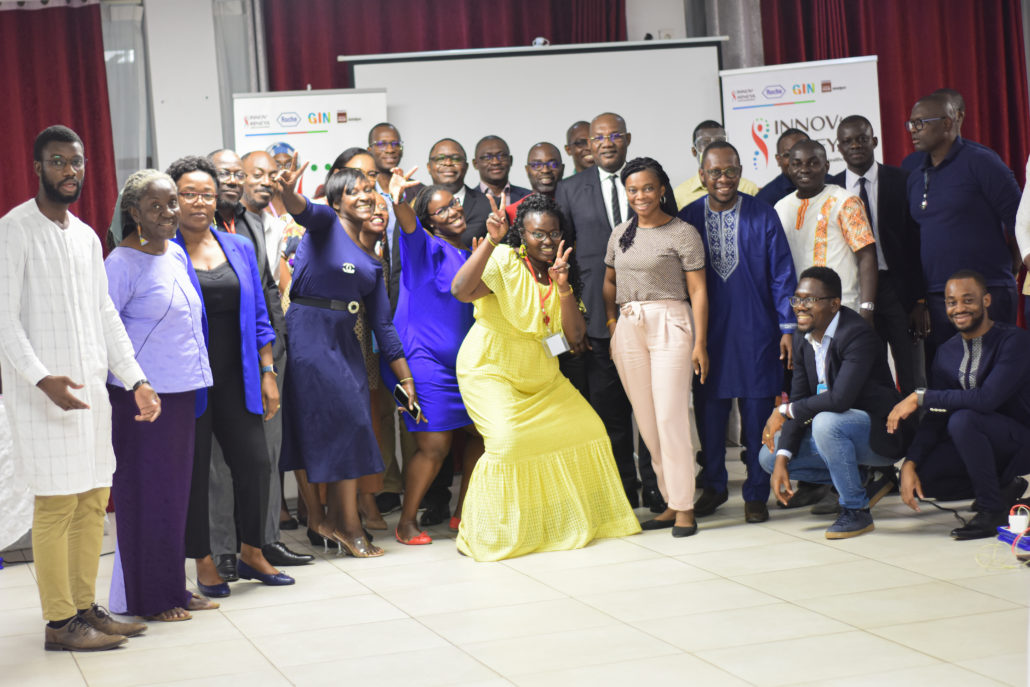Innov’Keneya is a healthcare innovation Ecosystem conceived to tackle and create solutions for the most pressing challenges surrounding the cancer Patient journey in Côte d’Ivoire. It aims to do so, on one hand, by bringing together and pooling resources from the most important and influential players of the cancer ecosystem. On the other hand, Innov’Keneya leverages their knowledge, expertise, and assets to bring Innovative solutions to tackle those complex challenges across the Healthcare delivery value chain in a collaborative approach.
The Innov’Keneya healthcare innovation program essentially rests on three key pillars:
Co-Creation
Innov’Keneya offers the opportunity for its partners to co–design innovative solutions with the potential of having a major and lasting impact on the different stages of the cancer patient journey. The solution-design process is set to be carried out in a collaborative environment where a variety of influential actors from the healthcare ecosystem come together to discuss, exchange and co create on existing cancer-related patient-centric challenges and how to confront them.
Innovation
A major focus of the program is the reinforcement, stimulation, and encouragement of innovation within the cancer ecosystem through capability building. Indeed, Innov’Keneya has also been designed to allow its partners to strengthen their innovation capabilities through extensive hands-on and experiential learning in design thinking and agile Frameworks.
Having an expansive journey that goes from Mapping the most complex challenges to Co-experimentation of disruptive solutions in a joint Innovation process: Empathizing and challenge definition stage, an ideation stage, followed by prototyping and ending with market testing. Partners will be supported and coached by a strong team of experienced design thinking and innovation experts, with the goal of optimizing the process.
Connections
Innov’Keneya presents itself as an opportunity to build a new network and community of healthcare innovators in Ivory Coast. The program not only strengthens already existing relations within the ecosystem, but is also a platform for new bonds and disruptive partnerships to emerge and redefine the whole ecosystem environment and encourage even more collaborations in the future.



Collaborators
Innov’Keneya is a program federating and pooling knowledge, expertise and experience from a diverse range of prominent local and international actors of the cancer ecosystem of Côte d’Ivoire.
This highly engaged and committed group of people is made up of 50 collaborators from the most diverse backgrounds and sectors:
Government Agencies & Programs: The Cancer Control Program, National Coordination of ICT for Health, National Health Insurance Fund
Healthcare Professionals: Oncologists, Pathologists, Pediatric-oncologists, and other healthcare professionals representing the University Hospital Center of Treichville, the Alassane Ouattara National Center of Oncology and Radiotherapy, the Mother-Child Hospital of Bingerville, the Medical Hotel of Taxes, the Private Clinics’ Association
NGOs: Wilic International, Shunamites, Aline, Soleterre, Hope Life, AEC, JHPiego
Entrepreneurs: Maisoin, Mousso Santé
Funders: National Health Insurance Fund, Lalla Salma Foundation, NSIA
Corporates: MTN, Orange, Novartis
Manifesto
MANIFESTO FOR A HEALTH SECTOR WHERE THE HEALTH OF POPULATIONS IS A PRIORITY.
We, the partners of the Innov’Keneya program, are committed to working hand in hand to strengthen the health ecosystem of Côte d’Ivoire, by putting the fight against cancer at the center of each of our actions. Because there is strength in numbers and because progress is only possible with a development mindset, we advocate collaborative innovation to serve our most ambitious dreams.
We declare our commitment in this community of innovators for the following ambitions:
- To drastically reduce the incidence and mortality rate of cancer in Côte d’Ivoire. Together, we are determined to build an ecosystem where:
- All detectable cancers are detected early
- 90% of patients with curable cancers are cured.
- Demystify cancer and make screening a part of the Ivorian way of life. For that, we will work to Incite:
- Health professionals (doctors, nurses…) to systematically look for cancer in their patients.
- Patients to ask for regular screening.
- Guarantee affordable and accessible medical care and follow-up for all Ivorians!
- Strengthen the existing ecosystem to make it an efficient, interactive and unified ecosystem around cancer patients.
With our participation in this program, we declare our commitment and responsibility to ensure the success of the pilot projects that will emerge from the program to improve the lives of patients in a sustainable and effective manner!
Challenge Definition
Three baseline challenges spanning across the entire cancer patient journey have been defined by Innov Kenya’s collaborators. They will be the starting points of the solution-design process.
These challenges are outlined as follows:
Challenge 1: Awareness & communication around prevention and screening
Challenge #1 includes the barriers faced by the patient during the early stages of their journey. Some of examples of issues that will be addressed under this theme include:
- Socio-cultural barriers:
- low literacy rate
- language barriers: There is a need to conduct awareness campaigns in local dialects (especially in rural areas where an important minority is not fully fluent in French)
- Pessimism about modern medicine and preference for traditional medicine
- The types of messages/information delivered to the masses need to be refined
- Difficulty finding/funding the right communication channels and the right people to deliver the awareness messages
- Information related to prevention/screening is scattered. There is a need to build an online/offline platform to centralize the information and make its access easier for every Ivorian
- Training of health workers and their involvement in the prevention/screening stage of the patient’s journey is limited
- Lack of financial and material support for NGOs to conduct frequent and high-impact mass awareness/screening campaigns
- Lack of clear directions/path to follow for suspected cancer cases
- Finding the right channel to reach the target population as well as the masses
- Integrating community chiefs/leaders into the awareness raising process
- Poor communication around healthcare discount programs (Roche’s Access program, 5K FCFA mammography at UHC of Treichville)
Challenge 2: Quality & limitations of initiatives around diagnosis & treatment
In this second innovation track, Innov’Keneya collaborators will address challenges mainly related to the diagnostic stage, in particular that of detectable cancers. Some of the challenges to be addressed in this context are:
- High cost of diagnosis (even for the insured). The types of cost include:
- Medical examination costs
- Indirect costs such as transportation and accommodation for populations leaving rural areas to get examined in Abidjan (the country’s economic capital)
- Limited number of facilities offering adequate diagnostic services and limited access to them
- Lack of advanced medical research in the field
- Low rate of early diagnosis of cancer cases due to lack of information on detectable forms of cancer
- Long delays in the treatment process and in obtaining diagnostic results due to the limited number of human resources (oncologists) / poor logistics management and lack of capacity building.
- Absence of coordination and very weak collaboration between laboratories and specialists to help complete each other’s testing panels
Challenge 3: Pooling of available resources to minimize treatment cost
Challenge #3 focuses primarily on issues related to cost across the patient journey, with a particular emphasis on treatment. Contributors will be asked to address questions on the following aspects:
- Limited access to care and treatment due to high cost
- Lack of coordination between healthcare actors for patients’ care and support: Actors within the ecosystem mainly work in silos
- Limited resources to properly track cancer patients’ data
- Lack of psychological post-treatment follow-up
- Limited availability of accommodation for patients coming from rural areas to get treated in Abidjan
- Centralization of healthcare resources (infrastructures, HCPs, etc…) in Abidjan
- Limited economic resources to help patients reinsert social life
- Lack of adequate palliative end-of-life care for patients
- High recurrence rate due to poor post-treatment follow-up
- High indirect costs (transportation, living costs) for patients traveling from rural areas to Abidjan
Gives & Gets
- Gives: What is expected from program collaborators?
- Share their expertise in understanding the challenges of the healthcare ecosystem
- Fully master the innovation process and put it into practice during the program and beyond
- Provide or contribute to the search for funding sources for the solutions that will be developed and implemented
- Enable access to their healthcare network
- Promote and advocate, within their organization and with the media, to maximize the chances of success of the program and the solutions that will emerge
2. Gets: What do collaborators get out of the program?
- The privilege of being an essential part of the OPEN INNOVATION process to improve the healthcare system in Côte d’Ivoire.
- The opportunity to join a program, 100% sponsored by Roche, to develop your ability to innovate and tackle complex healthcare challenges.
- Access to in-depth experiential and practical learning – DEEP LEARNING & DESIGN THINKING – in human-centered innovation to tackle the biggest health challenges in Côte d’Ivoire.
- The opportunity to be coached by international experts in solution design and innovation.
- Being part of a global community of healthcare innovators.